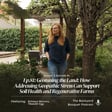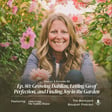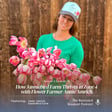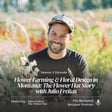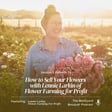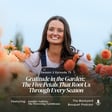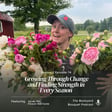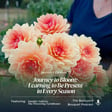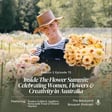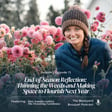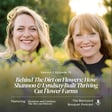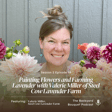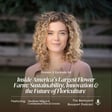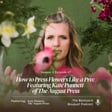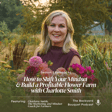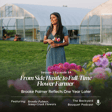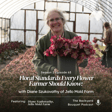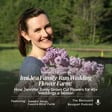
Ep.52: The Kindest Garden: Regenerative Gardening & Sustainable Design with Marian Boswall
How can we create gardens that are both beautiful and beneficial to the planet? In this episode of The Backyard Bouquet Podcast, we sit down with award-winning landscape architect and author Marian Boswall to discuss the power of regenerative gardening and sustainable landscape design. As the founder of Marian Boswall Landscape Architects and co-founder of the Sustainable Landscape Foundation, Marian has spent decades transforming gardens into thriving ecosystems. We explore her new book, The Kindest Garden, which shares practical tips for designing gardens that nurture both nature and the soul. Whether you're a backyard gardener or dreaming of a sustainable landscape, this episode is packed with inspiration!
In this episode, we discuss:
- What is regenerative gardening?
- How to design a garden that benefits biodiversity and soil health
- Practical ways to introduce regenerative principles in small garden spaces
- The importance of working in harmony with nature for long-term resilience
- Highlights from The Kindest Garden and Marian's approach to thoughtful garden design
🎧 Tune in now and learn how to create a garden that flourishes with kindness!
🔗 Connect with Marian Boswall:
- Marian’s book, The Kindest Garden: https://bookshop.org/a/2182/9780711289437
- Follow Marian On Instagram: https://www.instagram.com/marianboswall/
- Follow Marian Boswall Studio: https://www.instagram.com/marianboswallstudio/
- Marian Boswall Landscape Architects: https://www.marianboswall.com
📚Read For The Love Of Soil By Nicole Masters: https://bookshop.org/a/2182/9780578536729
Show Notes: https://thefloweringfarmhouse.com/2025/03/26/ep-52-the-kindest-garden-and-regenerative-gardening/
📌 Please Subscribe to The Backyard Bouquet Podcast for more flower farming insights!
***Rate, Review, & Follow The Backyard Bouquet***
If you enjoyed this episode, will you please consider leaving the podcast a review? Your review helps make the podcast more discoverable to others and allows me to continue creating more episodes. I'd love to know what you enjoyed most about the episode.
New episodes every week to help keep your garden blooming!
🌿 Your Dream Greenhouse Awaits! 🌿
If you've been thinking about adding a greenhouse to your garden or flower farm, now is the perfect time! I've been working with NW Green Panels for over six years, and their high-quality, custom-built greenhouses are truly game-changers for extending the growing season and protecting your plants.
✨ Exclusive Offer for The Backyard Bouquet Podcast Listeners! ✨
Get $750 off PLUS $500 in free accessories OR 5% off your total (whichever is greater)!
🔗 Mention Farmhouse to save on your new greenhouse
👉Design your greenhouse here: https://www.nwgreenpanels.com/
